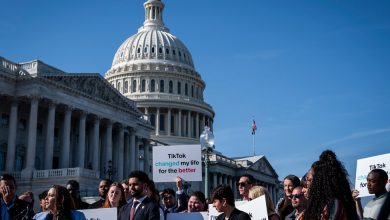The Week in Business: Creeping Layoffs

What’s Up? (Jan. 22-28)
Job Cuts, and Not Just in Tech
What began as a wave of ominous job cuts by technology companies is rippling through other industries, most recently media and retail. In the last week alone, layoffs, or reports of coming layoffs, have swept The Washington Post, Vox and Saks.com. Adding to the tens of thousands of unemployed tech workers, Spotify said on Monday that it was cutting 6 percent of its work force, or about 600 employees, and IBM announced on Wednesday that it would shed 3,900. Tech’s challenges may be somewhat particular to the sector — employers have largely pointed to overhiring during the pandemic as a reason for the recent cuts — but its upheaval can be an indicator of where the economy is heading. Yet even as layoffs appear to creep across the job market, unemployment claims overall remain low, and millions of jobs are open across the country.
A Growing Economy
Despite what might seem to be obvious harbingers of an economic downturn — mass layoffs, for example — there are other signs of relative health. Take gross domestic product, an indicator that was not as reliable at the beginning of the pandemic but has since normalized. The latest report on G.D.P., when adjusted for inflation, shows the U.S. economy grew at an annual rate of 2.9 percent in the fourth quarter of 2022, suggesting that it has been largely resilient in the face of inflation, high interest rates and the war in Ukraine. Though just a few months ago, G.D.P. numbers met one commonplace standard for determining a recession, the most recent data would seem to assuage fears. But only to a certain extent — many economists still expect a recession to begin later this year.
Elon Musk Takes the Stand
More than four years after he posted a tweet telling his followers that he had secured the funding to take Tesla private, Elon Musk, now the chief executive of both Tesla and Twitter, appeared in court to defend that statement against a lawsuit. He provided seven hours of testimony over three days, arguing that funding for a deal with Saudi Arabia’s sovereign wealth fund was plentiful but dodging a question about whether a specific dollar amount had been discussed. In the 2018 tweet, Mr. Musk suggested that he had secured $420 a share (a favorite number of the billionaire’s). Lawyers for the plaintiffs, a group of Tesla investors, are trying to build a case to prove that Mr. Musk’s actions led to the wild swings in Tesla’s stock, causing them to lose money. Some experts believe they are likely to succeed: Last year, the senior U.S. District Court judge hearing the case ruled that he agreed with the plaintiffs that Mr. Musk was “deliberately reckless” — investors’ words — when he posted the tweet.
What’s Next? (Jan. 29-Feb. 4)
A Smaller Rate Increase?
The Federal Reserve took its first step toward slowing its interest rate increases last month, when it broke a streak of aggressive three-quarter-point increases with a half-point one. At its meeting on Tuesday, the central bank may opt to slow its pace further. In recent weeks, Fed officials including Susan M. Collins, the president of the Federal Reserve Bank of Boston, and Christopher Waller, a Fed governor, have discussed the possibility of a quarter-point move. “There appears to be little turbulence ahead, so I currently favor a 25-basis-point increase,” Mr. Waller said. But he echoed his colleagues in emphasizing that their campaign to fight inflation was not over yet, and Jerome H. Powell, the Fed chair, has made clear officials’ intention to raise the policy interest rate to 5.1 percent by the end of the year.
Labor Market Resilience
The jobs report on Friday will provide the first glimpse at the strength of the labor market in 2023 — though it is expected to look a lot like the end of 2022. That is to say, like recent months of jobs reports, this one is expected to show another month of solid but slowing growth. The question is, how long can these conditions last? While the labor market has long been buoyant in defiance of the Fed’s attempts to cool the economy, the higher interest rates are still slowly permeating through the economy.
Slower Growth for Tech Companies
After a stretch of bad news for the country’s largest tech companies, this week’s quarterly earnings reports are poised to deliver … more bad news. Microsoft helped kicked off the tech-sector portion of earnings season last week by reporting its slowest growth in six years. Amazon, which will release its quarterly results on Thursday, the same day as Alphabet and Apple, is expected to report exceptionally slow growth — the slowest in two decades, analysts predict. While Amazon and its peers may be hurting, these companies continue to bring in billions in profit, and some are making big investments even as they say their aim with layoffs is to trim costs. Days after announcing plans to cut 10,000 jobs, Microsoft, for example, said it planned to invest $10 billion in the artificial intelligence lab behind the chatbot ChatGPT.
What Else?
Live Nation Entertainment, the parent of Ticketmaster, which canceled its plans to sell tickets to Taylor Swift’s upcoming tour, was cast as a monopoly by top Democrats during a Senate hearing (some used Ms. Swift’s lyrics to make their point). A glitch on the New York Stock Exchange on Tuesday led to wild price swings for major stocks, adding or wiping out billions in market value. Meta said it would reinstate former President Donald J. Trump’s Instagram and Facebook accounts “in the coming weeks.”



